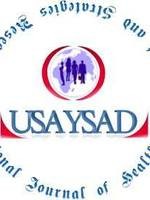UZAKTAN EĞİTİM SÜRECİNİN BİLGİ SİSTEMLERİ BAŞARI MODELİ VE TEKNOLOJİ KABUL MODELİ İLE İNCELENMESİ: OSTİM TEKNİK ÜNİVERSİTESİ ÖRNEĞİ
Uzaktan Eğitim, Bilgi Sistemleri Başarı Modeli, Teknoloji Kabul Modeli
EXAMINING DISTANCE EDUCATION PROCESS WITH INFORMATION SYSTEMS SUCCESS MODEL AND TECHNOLOGY ACCEPTANCE MODEL: EXAMPLE OF OSTİM TECHNICAL UNIVERSITY
___
- Bhuasiri, W., Xaymoungkhoun, O., Zo, H., Rho, J. J., & Ciganek, A. P. (2012). Critical success factors for e-learning in developing countries: A comparative analysis between ICT experts and faculty. Computers & Education, 58(2): 843-855.
- Bokhari, H. (2005). The relationship between system usage and user satisfaction a meta-analysis. The Journal of Enterprise Information Management, 18(2), 211-234.
- Davis, Fred. D. (1989). Perceived Usefulness, Perceived Ease of Use, and User Acceptance of InformationTechnology, MIS Quarterly,13(3): 319-340.
- Davis Gb (2000) Information systems conceptual foundations: looking backward and forward. In Organizational and Social Perspectives on Information Technology (baskervılle r, stage j and degross jı, eds), pp 61–82, Kluwer Academic Publishers, Boston.
- Gable, G., Sedera,D. & Chan,T., (2008) “Re- conceptualizing Information System Success: The IS – Impact Measurement Model”, Journal of the Association for Information Systems, 9. (7) Pp. 376-408
- Guimaraes, T., Armstrong, C. P., & Jones, B. M. (2009). A new approach to measuring information systems quality. The Quality Management Journal,16(1): 42.
- Hrastinski, S. (2008). Asynchronous and synchronous e-learning. Educause quarterly, 31(4), 51-55.
- Huber MW, Piercy CA & Mckeownpg (2007) Information Systems: Creating Business Value. John Wiley & Sons, Hoboken, NJ.
- Kurt, Özlem, Üniversite Öğrencilerinin Uzaktan Eğitime Bakış Açılarının Teknoloji Kabul Modeli ve Bilgi Sistemleri Başarı Modeli Entegrasyonu ile Belirlenmesi, Uluslararası Alanya İşletme Fakültesi Dergisi (International Journal of Alanya Faculty of Business) Yıl:2015, C:7, S:3, s. 223-234.
- Menzi, Nihal, Önal Nezih & Çalışkan, Erkan, Mobil Teknolojilerin Eğitim Amaçlı Kullanımına Yönelik Akademisyen Görüşlerinin Teknoloji Kabul Modeli Çerçevesinde İncelenmesi Akademisyen Görüşlerinin Teknoloji Kabul Modeli Çerçevesinde İncelenmesi, Ege Eğitim Dergisi, 2012 (13) 1: 40-55
- Petter, Stacie, DeLone, William & McLean, R. Ephraim (2012). “The Past, Present and Future of “IS Success”, Journal of the Association for Information Systems, 13(5): 341-362.
- Petter, S, DeLone, W & McLean, E (2012). “The Past, Present and Future of “IS Success”, Journal of the Association for Information Systems, 13(5): 341-362.
- Rafique, Hamaad, Shamim, Azra., & Anwar, Fozia. (2019). Investigating Acceptance of Mobile Library Application with Extended Technology Acceptance Model (TAM), Computers & Education, 145, 103732.
- Seddon, P. B. (1997). A respecification and extension of the DeLone and McLean model of IS success, Information systems research, 8(3), 240-253.
- Seker, Sadi Evren, (2014) DeLone ve McLean Bilgi Sistemleri Başarı Modeli, YBS Ansiklopedisi, Cilt 1 Say 3, 2014
- Venkatesh, Viswanath., Morris, G.Michael, Davis, B. Gordon.& Davis D. Fred (2003). User acceptance of information technology: Toward a unified view. Management Information Systems Quarterly, 27(3), 425-478.
- Yıldırır, S. ve Kaplan, B. (2018) Mobil Uygulama Kullaniminin Benimsenmesi: Teknoloji Kabul Modeli ile Bir Çalişma, Kafkas Üniversitesi İktisadi ve İdari Bilimler Fakültesi KAÜİİBFD Cilt, 10, Sayı 19, 2019 ISSN: 1309 – 4289 E – ISSN: 2149-9136
- Başlangıç: 2015
- Yayıncı: Zekai ÖZTÜRK
ANNE VE ANNE ADAYLARININ SÜT BANKASI İLE İLGİLİ TUTUMLARI
AN OVERVIEW OF PHYSICIAN-ASSISTED SUICIDE TOURISM
Diler KAHYAOĞLU, Nilüfer YÜCEDAĞ ERDİNÇ, Ferah KEKLİK OKUL
Egehan ÖZKAN, Seray YEŞİLIRMAK
Altuğ ÇAĞATAY, Selman KIZILKAYA
TÜRKİYE’DE HEMŞİRELİK VE TEKNOLOJİ ALANINDA YAPILAN ÇALIŞMALARIN İNCELENMESİ
SAĞLIK YÖNETİCİLERİNİN YÖNETSEL GÜÇLÜLÜKLERİNİN ARAŞTIRILMASI
SAĞLIK HİZMETİ KAYNAKLARININ KULLANIMINDA TEKNİK ETKİNLİĞİN OECD ÜLKELERİ ARASI KARŞILAŞTIRMALARI
ORAN ANALİZİ YÖNTEMİ İLE ÜNİVERSİTE DÖNER SERMAYE İŞLETMELERİNİN FİNANSAL DEĞERLENDİRİLMESİ
